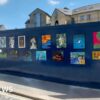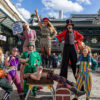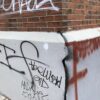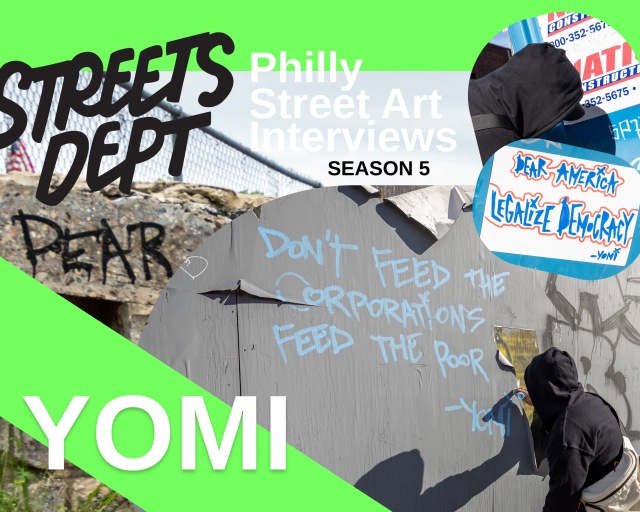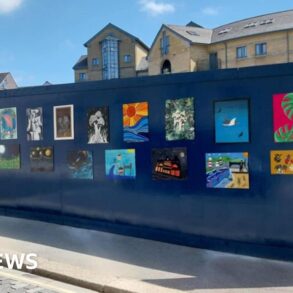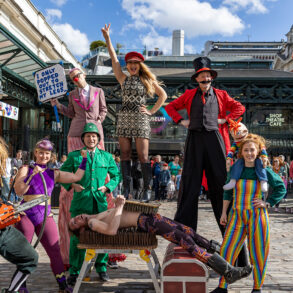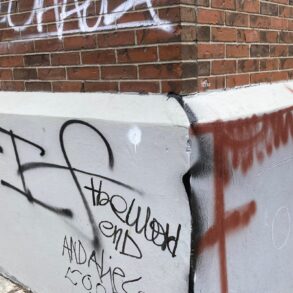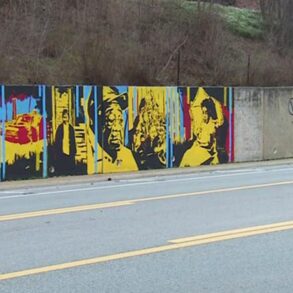Words and photos by Streets Dept Lead Contributor Eric Dale. Editor’s note: for various reasons, this interview is not a literal transcription of the artist’s words, and has been edited for content and clarity.
In the world of Philly street art, the name “YOMI” is almost synonymous with activism. The election of Donald Trump catalyzed many previously apolitical artists to start incorporating political statements into their work. But YOMI has been making political statements for much longer—due to an upbringing that people who were born in America simply can’t comprehend.
His upbringing is also what led him to graffiti—not as a medium, but as a societal imperative. When traditional communication is limited, graffiti kind of becomes a last resort. And a penchant for graff has made YOMI feel right at home in Philly for more than 20 years. As the 2024 election looms, I thought he would provide a valuable and different perspective on the state of things.
Ready to see the world through a gas mask? Read on.
Streets Dept Lead Contributor Eric Dale: Where does the name “YOMI” come from?
YOMI: I was playing with letters in my real name, which of course I won’t share here, and I came upon Y-O-M-I. It was the only shuffle that made sense, and it also kinda sounded familiar, so I looked it up and found out that “Yomi” is the Japanese word for hell or land of the dead—which was perfect for the character I had in mind. And it was short—only four letters; to the point—which is helpful for graffiti.
SD: And what does “TGMB” mean?
YOMI: “The Gas Mask Bastard.” The character was officially launched in late 2012, but the backstory of the YOMI character really began on April 26, 1986, with Chernobyl. I don’t think anyone that was present will ever forget that rainy Easter—the strangely colored sky, with eerie shades of yellow and ochre, colors I’ve never seen before or since. I remember the rain: the acidic bubbles in the puddles. I remember eating spring salads while the bastard politicians were importing uncontaminated food from overseas for themselves and their families.
Most of all, I remember all the years of communism, the concrete coercion of the state that compelled people to parade in “spontaneous manifestations” celebrating May 1. And we did it—we were told that the parade would go on as usual; nothing to be afraid of. That day, May 1, was recorded as one of the days that the fallout of Chernobyl over Bulgaria was at its heaviest. According to a lengthy research paper published in 2010 by the New York Academy of Sciences, which details the horrific extent of the fallout and its health effects, “one nuclear reactor can pollute half the globe.” Chernobyl fallout covered the entire northern hemisphere. No less than three billion people live in areas contaminated by Chernobyl’s radionuclides. More than 50 percent of the surface of 13 countries in Europe and 30 percent of 8 others have been contaminated, and the effects of it will be apparent for many generations.
SD: So you grew up in Bulgaria, and studied in Sofia, at the oldest art school in the country. What was your focus, and what did your artwork look like back then?
YOMI: My focus was on painting, including classes on poster design and frescoes—what we would call “murals”—which were very helpful. My artwork was mostly abstract. That was actually encouraged, because it wasn’t safe to paint more overtly political things. We were behind the Iron Curtain, so information from outside couldn’t get in, and information from inside couldn’t get out. That’s how the graffiti came about, because it was the only way to express some messages due to censorship.
SD: Are you saying that since what you wanted to paint was illegal, the only way to paint it was through the illegal medium of graffiti?
YOMI: Yes. Because while older generations felt comfortable and content due to successful brainwashing by the state, young people at the time were suffocating under the communist boot, and were gasping for air. The restrictions and control of every aspect of life were unbearable for young folks, especially since those restrictions were paired with extreme nationalism and anti-semitism. This, of course, was natural, due to the fact that Bulgaria sided with Germany back in 1941. That allowed pro-fascist ideologies to take root, which plagues the country to the present day.
All of this is a clear sign that more educational work is needed—as well as direct action to counter the increasingly emboldened hate of the far right ideology and propaganda. Activists and artists from central and eastern Europe have been sounding the alarm for decades, highlighting the dangers of allowing fascism to pass with impunity. Political graffiti as a form of protest, as a form of resistance, as a call to action was not just necessary; it was, still is, and will be mandatory.
SD: If Earth was a utopia with no social issues, what do you think you would paint?
YOMI: Honestly, I can’t imagine that, because conflict is human nature. We are an inherently violent species, and it will take a long long time for us to evolve to a point where there’s no more violence—presuming we’re still around as a species then.
SD: How is the art scene in Philly different from the art scene in Bulgaria?
YOMI: Philly is more vibrant, and very advanced since it’s the birthplace of modern graffiti. It’s very colorful. When you start from the sticker scene all the way to large-scale murals, it’s very unique and inspiring and has been influential in many countries around the world. Bulgaria is behind in many ways.
SD: Why did you move to the United States?
YOMI: The situation in eastern Europe was increasingly dire after the collapse of the Soviet Union, and my grandmother’s dying wish was for me to complete my art degree. She always saw something in me. I applied to several schools in other parts of Europe, but ultimately, the Pennsylvania Academy of Fine Arts provided the right opportunity for me.
SD: What surprised you most about America?
YOMI: The portrayal of America in the media vs reality. Growing up and living on the other side of the ocean, the media portrayal of America was sparkly; glittery—the ultimate place to be. And… it’s not.
SD: You used to be known for your eyeball imagery, but you seem to have moved away from that. What’s the reason for that?
YOMI: I’m not moving away from the eyeballs, but… Again, growing up in an oppressed environment—since Bulgaria was a Russian satellite and mirrored Russian propaganda—information, as well as life, was tightly controlled by the communist masters. Political graffiti was a way for people to express their feelings, fears, and frustrations. It was a way of fighting back—a dangerous way, since opposition of the state was not tolerated in any shape or form. A lot of those writers, primarily students, when captured, were sent to either prison or labor camp. They were labeled “traitors,” “conspirators,” and “enemies of the state.” For my own safety, my parents didn’t allow me to write. So I carried the buckets of paint! But I did get to see the impact and the power of words shouting off the walls. That stayed with me to the present day, and now, during the time I’ve been living here, witnessing how the U.S. is slipping from capitalist rule to violent authoritarian capitalist rule… These ideologies are present not only abroad but at home too. So the messages are too important, and I’ve been doing more work with words. Words are essential. Hopefully they’ll inspire direct action.
SD: Can we talk about your relationship with the activist art collective INDECLINE? How did you get involved with them?
YOMI: When I first started posting on Instagram back in 2013, AWARE (may he rest in peace) was one of the first people that started responding and interacting with the work I was doing. Then, when it became clear that Trump was not only going to be nominated but likely win the presidency, INDECLINE put out a call to activists everywhere to join the cause. I asked them to check out my page, and got an email in which they asked for more personal info. I provided that, with instructions to read and delete, and shortly after that, I got an email with the invitation to join the collective’s street team as a street soldier, doing poster, stencil, and sticker campaigns. I’ve also done a substantial amount of murals over the years on behalf of the collective as a collaboration.
SD: Are you comfortable talking about what happened to you a few years ago? All I know is that you stopped painting and your Instagram disappeared for a long time. But now you’re back! So I’m just curious what was going on at that time.
YOMI: I got arrested for graffiti, followed by a few other arrests at protests, which piled up on top of personal problems and coincided with finally getting my citizenship. My lawyer advised me to shut everything down, especially because of the citizenship part. And when your lawyer tells you that, you listen. I was charged with felonies, facing up to two years in prison plus probation and fines, but my lawyer got the felonies reduced to misdemeanors.
SD: You’re one of the most political street artists working in Philly right now. How would you describe the role of art in politics?
YOMI: It’s a powerful tool that can deliver visual playfulness, humor, stark simplicity, and directness, especially when dealing with painful subjects. Using art as a vehicle to spread propaganda and misinformation is a perfect example. At the same time, using art to fight back as an act of resistance, as a form of civil disobedience, is absolutely essential if we want to live in a democratic society. I see art as a spear that leads the charge. Because civil disobedience is not something that exists outside of the realm of democracy—it’s an essential part of it. Without civil disobedience, democracy doesn’t exist.
SD: Why are politics so integral to your art? Why is that your main subject matter?
YOMI: Because it gives me the sense that there’s still things worth living and fighting for. And because it scares the crap out of politicians and elected officials. They won’t admit it, but you can see it in their actions of intimidation, suppression, and silencing of artists, activists, and intellectuals all over the world.
SD: In recent years, you’ve painted numerous pieces in your “Dear America…” series. Where do all of those messages and phrases come from?
YOMI: From lived experience and observing the world, learning from literature and everyone that surrounded me good and bad, and writing thoughts down in blackbooks. And I do it as a necessity—for educational purposes and public service. Too many people in this big country remain ignorant, uneducated, and blissfully happy with the status quo. Too many choose to be fooled by conspiracy theories delivered on a silver platter by politicians and media pundits. The “Dear America“ series is outreach to those on the sidelines to step in and join the revolution.
SD: Being from Bulgaria, I imagine that Russia’s invasion of Ukraine must have hit you differently. Have you made any artwork relating to that conflict?
YOMI: Yes, and I have some in progress right now.
SD: What do you think Americans are missing about that war?
YOMI: Americans aren’t seeing what they are seeing in Palestine. The images and videos of daily horrors that ordinary Ukrainians face and struggle with just like the people of Gaza, Syria, and Lebanon. Images depicting atrocities that we’re now so accustomed and acclimated to and that were delivered by brave individuals and journalists, many of whom are now dead. On the Russian side, the information about what goes on is tightly controlled by the Russian government and media, and in the U.S. media, the war in Ukraine is largely ignored and presented as a summary of “key events.”
Americans aren’t seeing the missing U.S. soldiers who went to fight on behalf of Ukraine over the years as volunteers. Their stories have become clickbait buried deep underneath piles of the usual daily garbage of Donald Trump’s unhinged statements and clownish rallies. What Americans aren’t seeing is the daily rapes, torture, mass graves, and plethora of mistreatment and outright monstrous acts of violence witnessed by civilians and delivered by the Russian army. The misappropriation of funds and “misplacement” of weapons sent to Kyiv which are now missing, estimated to be worth more than $1 billion, according to a report by the Pentagon’s Office of Inspector General. The list is too long to continue. We won’t know the full scope of this war until it’s over and the layers of history get peeled off to reveal the truth.
SD: How are you feeling about the 2024 election?
YOMI: The same as any election: every election is important. If we don’t exercise our rights to participate in democratic processes (and sometimes go beyond the system to make our voices heard), we just end up giving more power to those who already have too much of it and the license to wield it as they see fit.
SD: Ahead of the election, what is the one message you want people to hear right now?
YOMI: Dear America, legalize democracy.
SD: What do you mean by that?
YOMI: That we as peoples hold the power to reject the past; to refuse to repeat it; to absolutely work tirelessly to change the status quo—and to seek new potential for the future of humanity.
SD: How do you think your art will change if Trump wins?
YOMI: It will get louder. It’ll get bolder in terms of getting deeper into the lion’s den, predominantly with issues of abortion rights, LGBTQ+ rights, public education, and immigration. These things will be under severe attack. As well as the specter of possible nuclear confrontation and climate change.
SD: How do you think your art will change if Kamala wins?
YOMI: The same: louder and bolder. We definitely don’t need another politician to deliver numbness to an already weak and atrophied body. We already had that during the Obama administration. During the Trump tenure, a momentum was built via direct action and protests all over the country. That momentum should have never stopped, and yet as soon as Joe Biden got into office, everyone put away their signs and their outrage and went back to la-la land. This complacency cannot continue at the expense of so much suffering and destruction, not just here but worldwide. We have the moral obligation to stand on the path of injustice and to fight to ensure a better, more fair, and peaceful future.
This post was originally published on this site be sure to check out more of their content.

